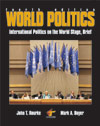To the outsider, the thought of being a president or
prime minister engaged in world diplomacy seems pretty attractive.
Your personal plane flies you to interesting places where you meet
important people. You stay in the best hotels or official residences
and are the host or the guest at lavish banquet after lavish banquet.
Not a bad deal, most people would say. Amazingly, though, leaders, foreign ministers, and other
diplomats often complain bitterly about the rigors of travel and ceremony.
Tight schedules and jet lag often exhaust diplomats. Yet they are
under great pressure to look alert, to be charming, and above all,
to avoid mistakes. That is difficult, though, because presidents and
other world leaders are humans who sometimes succumb to the hazards
of travel like everyone else. Ronald Reagan once fell asleep while
listening to a speech by the pope. Jimmy Carter was felled in Mexico
City by what he undiplomatically called Montezuma's revenge. And while
in Tokyo, George Bush was so indisposed that he threw up on the Japanese
prime minister and fainted. American presidents are not the only ones
to suffer. There are yet other diplomatic travel travails. Bush's
secretary of state James Baker has recalled wearily that King Fahd
of Saudi Arabia liked to hold meetings in the middle of the night.
Perhaps even worse, Baker remembers, Syria's president Hafez al-Assad
held marathon meetings, including one that lasted "for nine and
a half hours with only one break to go to the bathroom." Baker
has labeled the painful memory "bladder diplomacy."1 Then there is the calorie challenge. Dining can be a delicious
part of diplomacy, but there are many hazards to what has been waggishly
labeled "mealpolitik" and "gravy-boat diplomacy."
One peril is being confronted with things that you are expected to
eat to avoid injuring local sensitivities. President Bush dined on
boar's penis soup while visiting China in 1989. One American at the
dinner recalls hoping that there had been a translation error, but
finding out it was "what everyone thought it was, we did our duty."2
Only slightly more palatable moose lips appeared on Bill Clinton's
presidential plate during a 22-course dinner hosted by President Boris
Yeltsin
in Russia. "This was not a chocolate dessert," joked
one American official.3 Mealpolitik can also result in unwanted diplomatic gains.
President Clinton, whose junk food proclivity is near-legendary, once
hosted Chancellor Helmut Kohl of Germany at what may have been
a world-record lunch in 1994. When the two arrived at a Washington,
D.C., Italian restaurant, Clinton announced expansively, "I want
some of that pasta!" "What kind?" the maître d' inquired.
"That's the problem," the president replied. "It all looks
good."4 Not wanting to miss too many of the restaurant's
delights, the two world leaders opened with an antipasto; squeezed
in some calamari (squid); munched buttered breadsticks; spooned up
Tuscan white bean soup; had another salad; squared off against a heaping
plate of ravioli; drank some red wine; and finished off with zabaglione
and berries for dessert. The damage: about 3,300 calories each.5
Then, worried that they might get hungry while en route back to the
White House, Clinton and Kohl each ordered a large piece of chocolate
cake to go. Perhaps reflecting such meals, Clinton greeted Kohl at
another meeting with an exuberant, albeit diplomatically questionable,
"I was thinking about you last night, Helmut, because I watched
the sumo wrestling on television. You and I are the biggest people
here." Then, sensing that Germany's chancellor might not find
it complimentary to be equated with a 500-pound sumo wrestler, Clinton
added, "we're still 100 pounds too light."6 Kohl, who maintains two differently sized sets of suits
to accommodate the ebb and flow of his waistline, may have been offended,
but he was not deterred. In 1996 he and his wife, Hannelore, published
a cookbook of 350 of their favorite German specialties. Designed to
promote culinary tourism to Germany, the book includes recipes and
the chancellor's folksy commentary on the delights of Germany and
its cuisine. "Cabbage blows a man up, but nourishes him,"
Chancellor Kohl notes helpfully. He also confides that an alluring
dish, Palatine Sow's Stomach, is his favorite. The recipe calls for
10 pounds of pork chunks, potatoes, and spicy minced pork (along with onions and herbs) to be sewn up and baked in a fresh pig's belly,
which, Kohl cautions, "must be ordered from the butcher in advance."7 Notes 1. Time, September 20, 1993, p. 28. 2. New York Times, June 28, 1998, p. WK7. 3. Time, January 24, 1994, p. 38. 4. Hartford Courant, January 1, 1994, p. A3. 5. Newsweek, February 14, 1994, p. 8. 6. Newsweek, January 24, 1994, p. 19. 7. All quotes are from the New York Times,February 8, 1996, p. A13. |



 2002 McGraw-Hill Higher Education
2002 McGraw-Hill Higher Education